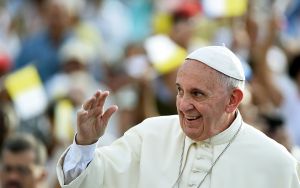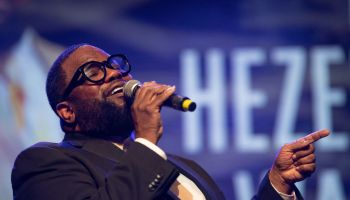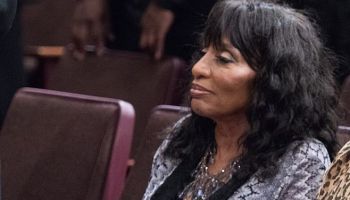
Source: FILIPPO MONTEFORTE / Getty
On Monday Pope Francis brought his message of reconciliation into a volatile Muslim neighborhood of Central African Republic’s capital as he visited the city’s main mosque, insisting that Christians and Muslims have long lived peacefully together here and that religion can never justify violence. Under heavy security, Francis crossed into the PK5 neighborhood where Bangui’s Muslims have been unable to leave for months due to the armed Christian militia fighters who surround its perimeter.
The pope’s visit immediately ushered in a greater sense of freedom to the area. In what had been a no-man’s land separating the Muslim enclave from the rest of the city only the day before, thousands crossed over into the area chanting “war is over” in the local Sango language after the pope’s departure.
Francis had insisted on coming to the PK5 neighborhood to appeal for peace in a country where two years of Christian-Muslim violence has divided the capital and forced nearly 1 million people to flee their homes.
Pope Francis said “Christians and Muslims and members of traditional religions have lived peacefully for many years. Together, we say no to hatred, to vengeance and violence, especially that committed in the name of a religion or God.”
The pope’s visit to the mosque marked the highlight of his three-nation African tour, with previous stops in Kenya and Uganda. In 2013 Central African Republic descended into conflict when Muslim rebels overthrew the Christian president.
Francis urged the international community to not view the country as doomed to a cycle of violence, saying “Yes, I confirm, Christians and Muslims of this country are condemned to live together and love one another.” Before the fighting drove away many Muslims, Central African Republic was 37 percent Catholic and about 15 percent Muslim, with traditional faiths and Protestants making up the rest, Vatican figures show.
The conflict did not begin over religious ideology but rather found its roots in a bid for political power. Muslim rebels from a number of groups in the north united in a bid to oust the president of a decade, citing grievances he had failed to follow through on promises and had neglected their part of the country.
The anti-Balaka Christian militia then arose after the Muslim rebels took power and committed atrocities against Christians. As the conflict surged, the Christian militias began targeting symbols of Islam, destroying mosques and attacking civilians who wore traditional Islamic clothing.
Francis reminded the Muslims in the central mosque that the origins of the conflict wasn’t religious and urged them to put their own interests aside. He said “We must remain united to prevent any action from either side that disfigures the face of God or has at its base the goal of defending particular interests at the expense of the common good.”
For more information click here
Text “LIGHT” To 37890 for your chance at ticket giveaways and news before anyone else!…Standard Messaging Rates Apply















